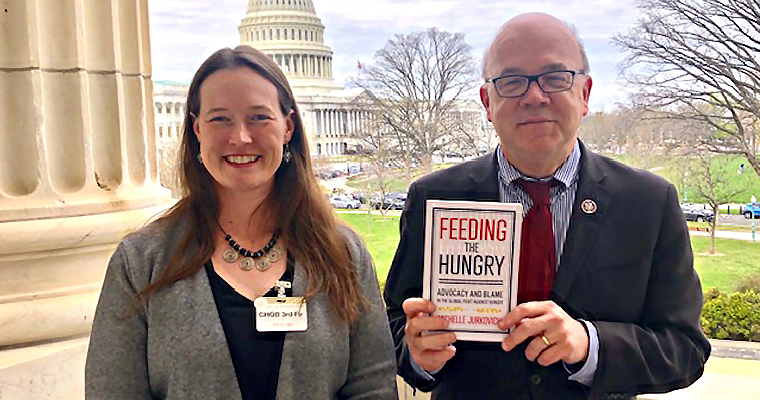UMass Boston Professor Discusses Hunger and Food Insecurity with Congressman James McGovern
More than 38 million people are food insecure in the United States, and the pandemic and accompanying economic downturn continue to make the situation worse.

As American hunger hits new highs, legislators are planning a national White House conference on food, nutrition, hunger, and health to discuss the root causes and identify solutions to the hunger, food and nutrition insecurity epidemics. Assistant Professor of Political Science Michelle Jurkovich traveled to Washington D.C. this month to meet with Congressman James P. McGovern, one of the conference planners, to discuss her research on hunger.
“This would be the first time the White House has hosted a conference on hunger and health since the Nixon Administration, so it’s very significant,” Jurkovich said.
Jurkovich spent an hour with McGovern talking about her recent book, Feeding the Hungry: Advocacy and Blame in the Global Fight against Hunger, and listening to the challenges the congressman has faced trying to enact legislation that could help to reduce hunger both domestically, and internationally.
“It’s an issue that the congressman cares a lot about and has been working hard to improve, but it is a difficult issue,” Jurkovich said. “We discussed some of the persistent obstacles to improving food policy and reducing hunger rates at home and abroad.”
The meeting was set up by the John W. Kluge Center at the Library of Congress, where Jurkovich served as a Kluge fellow in 2021, working on a new project on the history of refugee food rations.
For Jurkovich, this meeting was a great example for her students.
Jurkovich teaches a hybrid modality Politics of Food Security course, which examines food through the lens of development, human rights, governance, and security concerns. The course is designed to bridge theory and academic scholarship on hunger and food security with insights from practitioner trainings and discussions with those working in the field of food security and humanitarianism.
“The visit with Congressman McGovern, to me, was right along that vein, which is my interest to be both actively engaged in research and allow that scholarship to be policy relevant and useful in the world,” she said.
Using the hybrid modality, Jurkovich is able to bring in practitioners virtually to class sessions who have diverse expertise working in NGOs, government agencies, and the private sector to discuss their career paths and insights from the field. Jurkovich was awarded a Spring 2022 Pedagogical Innovation Award for this course by the College of Liberal Arts. Funds provided by this award have facilitated bringing in additional practitioners.
“The goal is for students to leave this class not only with the theoretical knowledge about food insecurity, but seeing how it ties to the problem on the ground and work that’s being done on the ground,” she said.
Jurkovich was drawn to learn more about issues of hunger and food insecurity issues while growing up in Fresno, California, which is the largest agricultural producing county in the country, but also has some of the highest rates of concentrated poverty.
“In Fresno, hunger exists side by side with tremendous agricultural plenty,” she said. “And so for me, what drove me to grad school, was this core question of: ‘How does hunger exist in the midst of plenty?’ Because of where I’m from, it was very obvious it wasn’t a supply problem, because we were surrounded by really good food. It was clearly a political problem, and one I wanted to understand.”
Jurkovich hopes her latest trip to Washington D.C. is just the beginning of a longer conversation around hunger.
“It’s the most important thing,” she said. “Why get involved with studying something like hunger if you don’t want to be able to work toward its elimination? The hope is that you spend a career and you move the ball just a tiny little bit forward.”
